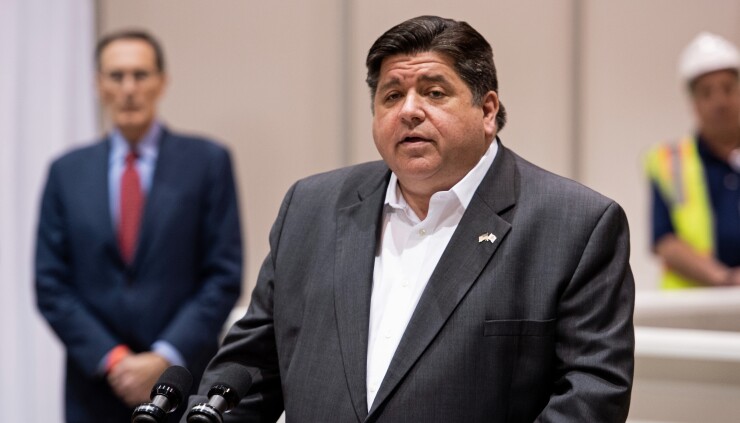Fitch Ratings lifted Illinois’ rating two notches to BBB-plus Thursday, handing the state its second positive rating action in recent weeks as it preps an up to $1.8 billion
The upgrade moves the rating in line with Moody’s Investors Service,
Last year's upgrades followed an infusion of $8 billion in federal COVID-19 relief and ballooning tax collections. Fitch held off to see how the state would manage its surpluses and how it would shape the fiscal 2023 budget but it did move the state's outlook to positive from negative and signaled the possibility of a multi-notch upgrade if the state kept up its fiscal momentum.

The reward for paying off its $2 billion federal Municipal Liquidity Facility loan early and paying down $900 million of outstanding inter-fund borrowing and $900 million of overdue insurance bills while building up a depleted reserve to $1 billion and supplementing pension contributions by $500 million came with Thursday's upgrade.
The upgrade “reflects fundamental improvements in Illinois' fiscal resilience including full unwinding of pandemic-era and certain pre-pandemic non-recurring fiscal measures, meaningful contributions to reserves and sustained evidence of more normal fiscal decision-making,” Fitch wrote. "Steady reduction in accounts payable, retirement of outstanding budgetary liabilities and smoother fiscal decision-making have become sustainable.”
The state’s accounts payable, previously known as the bill backlog, was down to $2.1 billion Thursday with bills paid on a routine payment cycle, according to Comptroller Susana Mendoza. It hit a high of $16.7 billion in 2017.
Fitch also considers the state’s use of its American Rescue Plan Act relief “measured” with $2.7 billion going to help pay off a $4.5 billion federal unemployment trust loan, $2.8 billion for infrastructure and other one-time measures, and $1.5 billion for operating needs with remaining funds planned for healthcare facilities, small businesses and affordable housing.
The upgrade gives Gov. J.B. Pritzker more good news to boast of as the Democrat seeks a second term in November. Last year’s upgrades have played prominently in his campaign advertisements.
"Balanced budgets four years in a row, paying the state's bills on time, early repayment of pandemic-related borrowing, clearing out debts left by previous administrations, making higher-than-required pension payments, setting aside $1 billion in savings for a rainy day — this is what responsible fiscal management looks like," Pritzker said in a statement.
GOP critics counter that the state failed to adopt structural reforms and so is ill-prepared to manage through a sustained economic downturn without reverting back to one-time measures.
Illinois remains the lowest-rated state and chronic strains led by a $139.9 billion pension tab for a system just 42.4% funded remain burdensome with statutory contributions that fall short of an actuarial level fueling a structural imbalance.
The rating “also reflects the state's elevated long-term liability position and resulting spending pressure, as well as a long record of structural imbalance primarily related to pension underfunding,” Fitch wrote. “Sizable gaps in pension funding and limited resilience to future downturns, despite recent additions to reserves, persist.”
In tandem with the GO and issuer default rating upgrade, Fitch lifted the state’s sales tax backed Build Illinois bonds to A from BBB-plus. The credit benefits from healthy debt service coverage ratios but is capped at two levels above the state’s issuer rating. The outlook on all the ratings is stable.
Fitch also moved the Metropolitan Pier and Exposition Authority's rating up two notches to BBB from B-plus, restoring it to an investment grade. Fitch caps the rating at one notch below the state’s. Expected growth in sales taxes also contributed to the upgrade.
The state’s last Fitch upgrade came in April 2010, to A-plus from A, but that was due to
“The last ‘standalone’ upgrade of Illinois’ rating by Fitch was in June 2000 when we upgraded to AA-plus from AA,” said lead Illinois analyst Eric Kim.
The state will sell as soon as mid-May $925 million of new money GOs to fund capital projects and fund an ongoing pension buyout program. The state also intends a current refunding of up to $900 million.
Citigroup Global Markets Inc. and Siebert Williams Shank & Co. are joint senior managers.
Also on Thursday, Pritzker signed
The buyouts had been funded by $1 billion of GO authority, $175 million of which was tapped in the state’s
Rating moves into single-A would require Illinois to make further progress in narrowing the gap between its statutory and an actuarial pension contribution and move towards doubling its reserves. The state’s $10.8 billion statutory payments fall about $4.1 billion short of an actuarially determined contribution.
Reverting back to old patterns of “irresolute and contentious fiscal decision-making that could include delayed budgets with unsustainable fiscal measures ... could drive a downgrade,” Fitch said in a reference to the two-year budget stalemate during former Gov. Bruce Rauner’s tenure that left the state on the verge of junk.
Fiscal 2022 revenues are tracking 9.3% or $1.9 billion above budget with sales taxes up $1 billion from the enacted budget pushing overall general fund revenues up to $41 billion, $4.5 billion over budget, Fitch said.
Those numbers could further rise based on April collections reported by the legislature’s Commission on Government Forecasting and Accountability. April tax collections landed at $8 billion, a record month for income tax collections. Personal income tax collections grew $2.3 billion and corporate income taxes grew by $560 million.
While the growth over last year still surpassed expectations, the April increase over last year was driven in part by a one-month extension in the personal income tax filing deadline last year to May so COGFA warned that the May numbers this year will likely fall, according to the report authored by Eric Noggle, senior revenue analyst.
With two months of the fiscal year remaining, base receipts are up an “astonishing” $5.965 billion with personal income taxes accounting for $3.3 billion, Noggle wrote.





